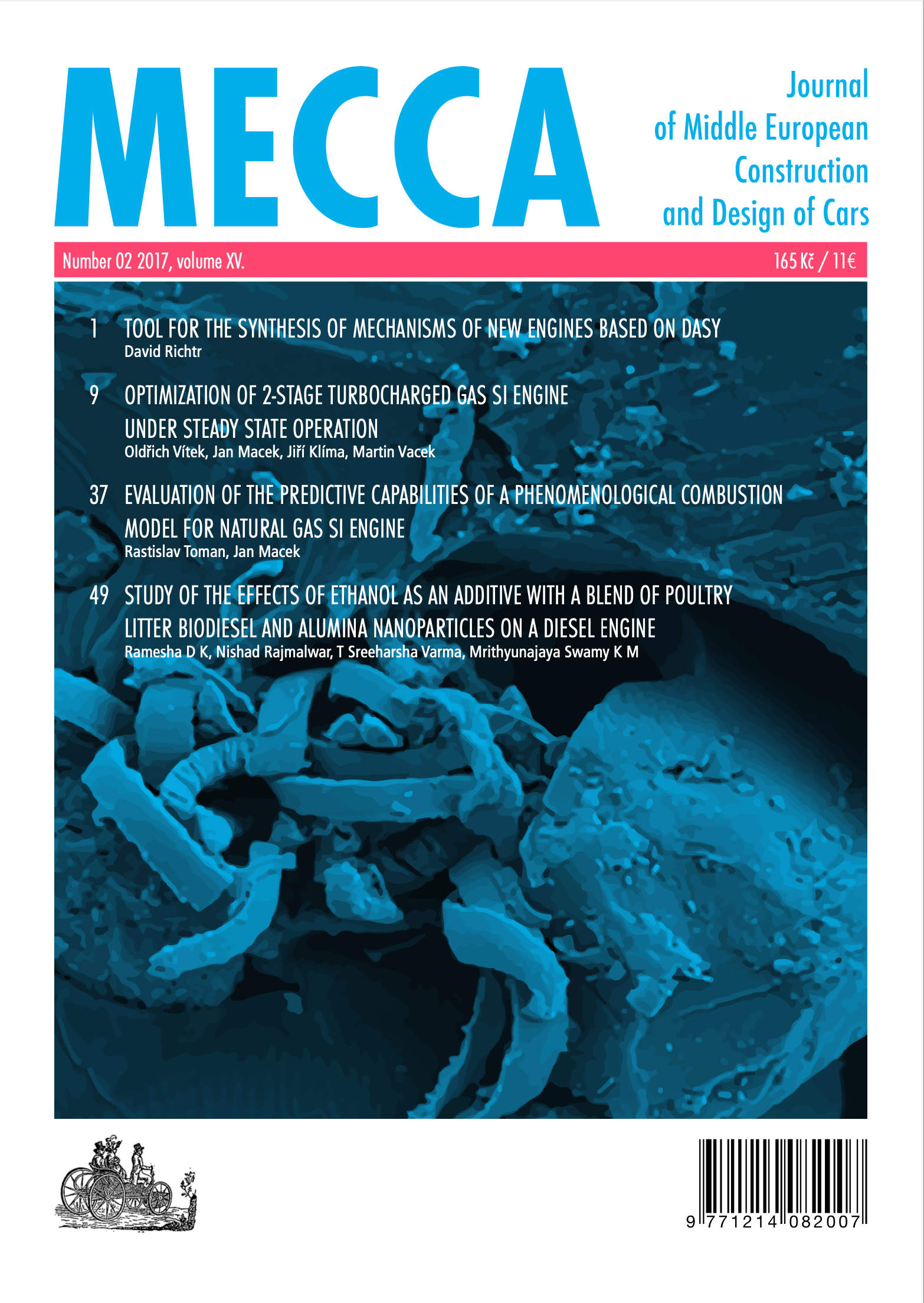STUDY OF THE EFFECTS OF ETHANOL AS AN ADDITIVE WITH A BLEND OF POULTRY LITTER BIODIESEL AND ALUMINA NANOPARTICLES ON A DIESEL ENGINE
Abstract
With the increasing population and rise in industrialization, the demand for petroleum reserves is increasing almost daily. This is causing depletion of the non‐renewable energy resources. This work aims to find an alternative fuel for diesel engines. The use of poultry litter oil biodiesel obtained from poultry industry waste, which is a non‐edible source for biodiesel, is very encouraging as an alternative fuel for diesel engines. The aim of this study is to observe and maximize the performance of poultry litter oil biodiesel by adding alumina nanoparticles and ethanol. The biodiesel is prepared with acid and the base catalysed transesterification of poultry litter oil with methanol using concentrated sulphuric acid and potassium hydroxide as catalysts. The experimentation is carried out on a CI engine with three different blends – B20 biodiesel blend, B20 biodiesel blend with 30 mg/L alumina nanoparticles, and B20 biodiesel blend with 30 mg/L alumina nanoparticles and 15 ml/L ethanol. The performance, combustion and emission characteristics of all three blends are compared with neat diesel. The results of the experiment show that ethanol as an additive improves the combustion and performance characteristics. It increases the brake thermal efficiency and peak cylinder pressure. It also reduces CO and UBHC emissions and there is a marginal increase in NOx emissions as compared to neat diesel.
S rostoucím počtem obyvatel a nárůstem industrializace se den za dnem zvyšuje poptávka po ropných rezervách. To způsobuje vyčerpávání neobnovitelných zdrojů energie. Tato práce si klade za cíl nalézt alternativní palivo pro dieselové motory. Použití bionafty získané z oleje z použité podestýlky z chovů drůbeže, která představuje nekonzumovatelný zdroj pro výrobu bionafty jako alternativní palivo pro dieselové motory, je velmi slibné. Cílem této studie je pozorovat a maximalizovat výkon bionafty z oleje z použité drůbeží podestýlky přidáním nanočástic oxidu hlinitého a etanolu. Bionafta je připravována kyselinou a zásadou katalyzovanou transesterifikací oleje z použité drůbeží podestýlky a metanolem, kde jsou jako katalyzátory použity koncentrovaná kyselina sírová resp. draselný louh. Experimentace se provádí na vznětovém motoru s třemi různými druhy směsi – směs bionafty B20, směs bionafty B20 s 30 mg/L nanočástic oxidu hlinitého a směs bionafty B20 s 30 mg/L nanočástic oxidu hlinitého a 15 ml/L etanolu. Parametry výkonu, spalování a emisí všech tří směsí jsou srovnávány dieselovým palivem (naftou) bez přísad. Výsledky experimentu ukazují, že etanol jako aditivum zlepšuje parametry spalování a výkonu. Zvyšuje brzdnou tepelnou účinnost a maximální tlak ve válci. Dále snižuje emise CO a nespálených uhlovodíků, přičemž je zde marginální zvýšení emisí NOx oproti naftě bez přísad.
Downloads
Published
Issue
Section
License
Copyright (c) 2017 D. K. Ramesha, Nishad Rajmalwar, T. Sreeharsha Varma, K. M. Mrithyunajaya Swamy

This work is licensed under a Creative Commons Attribution 4.0 International License.
Authors who publish with this journal agree to the following terms:1. Authors retain copyright and grant the journal right of first publication with the work simultaneously licensed under a Creative Commons Attribution License that allows others to share the work with an acknowledgement of the work's authorship and initial publication in this journal.
2. Authors are able to enter into separate, additional contractual arrangements for the non-exclusive distribution of the journal's published version of the work (e.g., post it to an institutional repository or publish it in a book), with an acknowledgement of its initial publication in this journal.
3. Authors are permitted and encouraged to post their work online (e.g., in institutional repositories or on their website) prior to and during the submission process, as it can lead to productive exchanges, as well as earlier and greater citation of published work (See The Effect of Open Access).

